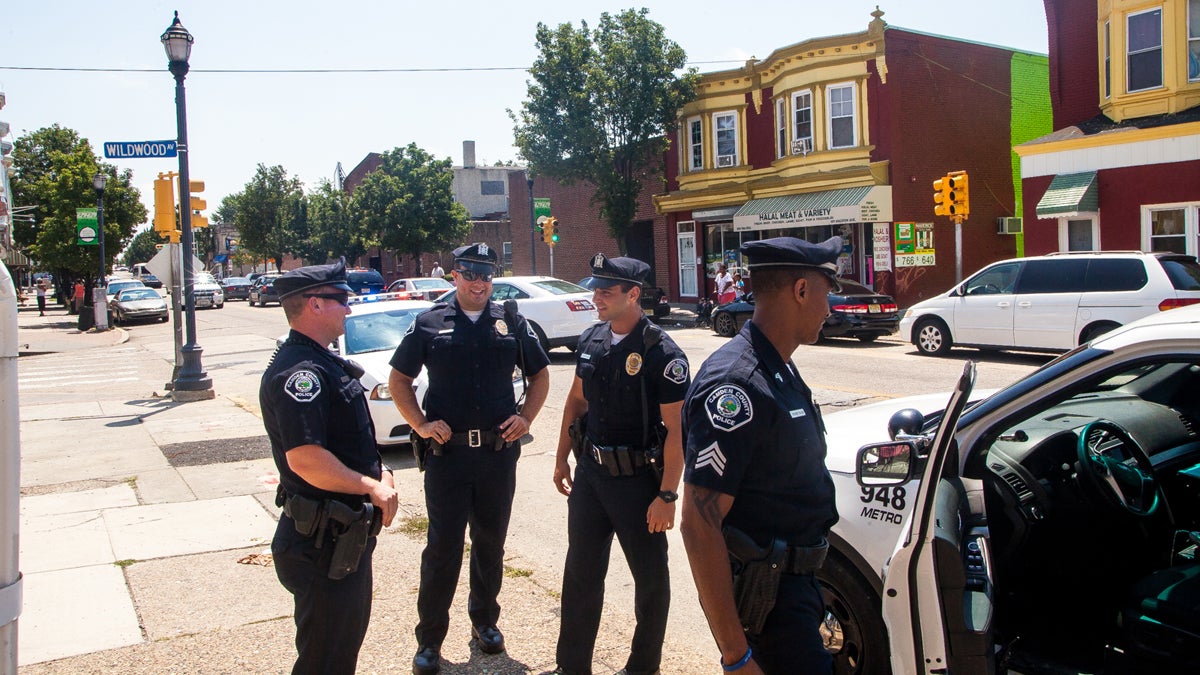Armed with respect and compassion, Camden cops making transition to ‘ethical protectors’ [photos]
Listen
Officer Jarred Levenson, third from left, talks with other county Police who were standing on Haddon Avenue in Camden, Nj. (Brad Larrison/for NewsWorks)
On a muggy afternoon, 20 officers with the Camden County Police Department are sitting in a spare recreation room in Spring Lake, New Jersey – an hour and a half drive and a world away from the rough streets they patrol.
It’s day one of a three-day training program guided by a simple, but weighty principle: respecting life saves lives.
That goes for residents and cops.
It all starts with good communication skills and, specifically, with practicing the “universal greeting,” a semi-scripted way for officers to introduce themselves and, hopefully, keep things calm when responding to a call.
It’s the first, and perhaps most important, step to becoming an “ethical protector,” a cop who has compassion for the life of everyone they encounter, even if they’re suspected criminals.
“Ordering people around raises the stress level. What are we trying to do here? De-escalate,” Jack Hoban, a speaker with Resolution Group International, tells the group during the afternoon session.
The greeting, not surprisingly, kicks off with kind of greeting – good evening or a simple hello.
The officers are then instructed to tell residents their name, affiliation, why they’re there, and ask a relevant question.
All together, it would go something like this:
“Good afternoon.
My name is Lt. Lutz with the Camden County Police Department. The reason why I’m here is we got a report there was a loud noise coming from the house. Is everybody all right here?”
Seems simple. But for some officers, being an ethical protector means unlearning habits formed over years.
Officers including Lt. Linda Alicea, who doesn’t typically smile or greet people when she’s on scene.
“I’m not usually nice like that,” says Alicea to laughter while practicing the exercise in front of her peers.
Hoban says the point of the “greeting” is to make it second nature to inject kindness and respect into every interaction. The thought is an angry or aggressive officer raises stress levels and, with it, the chance of a situation escalating, turning violent and maybe even becoming national news.
But it’s also meant to be strategic. Hoban says things easily could become dangerous – even fatal – if an officer doesn’t tell drivers why they’ve been pulled over.
Say an officer stops a man for having a broken taillight, but, unknown to the officer, the man has also just robbed a bank.
“If you go up to him and say, ‘driver’s license and registration’, what does this guy think you stopped him for? The bank robbery, right? Now he’s pulling out his gun because he doesn’t want to go back to jail. Pop. Pop,” says Hoban.
Hoban’s program is also about giving officers the tools they need to stay emotionally stable. He argues it’s easier for healthier officers to develop real relationships with the people they serve.
The hard — and healthy — work of tearing down walls
But it’s harder than it sounds. Needless to say, being a cop is difficult, especially in a high-crime area like Camden. There’s a lot of stress and, at least initially, a good deal of personal trauma from seeing so much violence day in and day out.
And so, cops often compartmentalize in order to cope and do the job.
“In order to deal with all of that death, you start to not look at people as actually being human. They start to become body counts. You don’t look at them like you would your brother or sister because that would emotionally eat away at you. But you start to lose pieces of yourself,” says Sgt. Raphael Thornton.
That, says Thornton, is when police officers are more likely to step over the line, something every police department in the country is working overtime to avoid these days.
“We’re in a bad place right now for police officers in our country. What’s at stake is the trust, the respect and the basic overview of how our citizens view police officers,” says Thornton.
“Just by learning to greet someone kind of takes a step in tearing down that wall of us and them.”
In the coming weeks, the Camden officers trained in Spring Lake will pass along what they’ve learned to the rest of the force through an internal mentoring program.
Chief Scott Thomson says success here will be more subjective than statistical.
“We’re not measuring the number of arrests you make. We don’t care about that,” he says. “Our objective is to have children playing in the street, people being able to sit on their front steps. Only way to do that is for you to go into that neighborhood and for them to know you and build that trust.”
It’ll be roughly a year before every officer on the force is trained to be an ethical protector.
WHYY is your source for fact-based, in-depth journalism and information. As a nonprofit organization, we rely on financial support from readers like you. Please give today.





